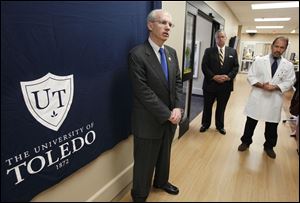
UTMC reports no surprises from review
11/28/2012
Dr. Jeffrey Gold, medical director and executive director at The University of Toledo Medical Center, left, said the hospital has already addressed issues cited by the agency in the inspection and implemented any required changes.
Findings in an extensive federal review of the University of Toledo Medical Center conducted three weeks ago and triggered by an August kidney transplant surgery error produced no surprises, and the institution has already taken steps to correct all of the issues, according to UTMC officials.
UTMC, the former Medical College of Ohio, on Tuesday received a 73-page report from the Ohio Department of Health as the follow-up to a survey conducted the week of Nov. 5 on behalf of the U.S. Centers for Medicare & Medicaid Services.
RELATED: Letter sent to UTMC by the Ohio Department of Health
Dr. Jeffrey Gold, chancellor and vice president for biosciences and health affairs at UTMC, said the report is closely aligned with what the team of inspectors relayed verbally to university officials on Nov. 8 during an exit interview.
“There is nothing in the letter [sent with the report] that is unexpected, that we didn’t anticipate, and is not consistent with where we thought we would be at this time,” he said.
The visit followed an Aug. 10 transplant incident in which a usable kidney was thrown out and rendered useless during a transplant procedure at UTMC. The hospital voluntarily ceased its live kidney donor program, as federal and state reviews and reports continue.
The four-day review by the agency that administers Medicare and Medicaid includes “condition-level” deficiencies that must be corrected or the hospital could lose its Medicare funding on Feb. 5, according to the letter.
Dr. Gold said the condition-level deficiencies call for improvements in the areas of operative services and issues related to plant safety.
UTMC officials declined to disclose details of the agency’s findings without approval from the university’s legal counsel.
Dr. Gold said the hospital has already addressed issues cited by the agency in the inspection and implemented any required changes.
Under federal guidelines, UTMC has 10 days to respond to each deficiency in the report with a plan of correction, and in turn the agency will get back to UTMC with documentation on the compliance plans within 10 days.
Dr. Gold said that if the hospital’s plans are accepted, the survey team will return to the hospital in late December to inspect and review the facility to determine if it is in compliance with federal regulations.
“We believe that we are in full compliance with all of their conditions of participation currently, and in our documents and follow-up site visit will continue to demonstrate that,” he said.